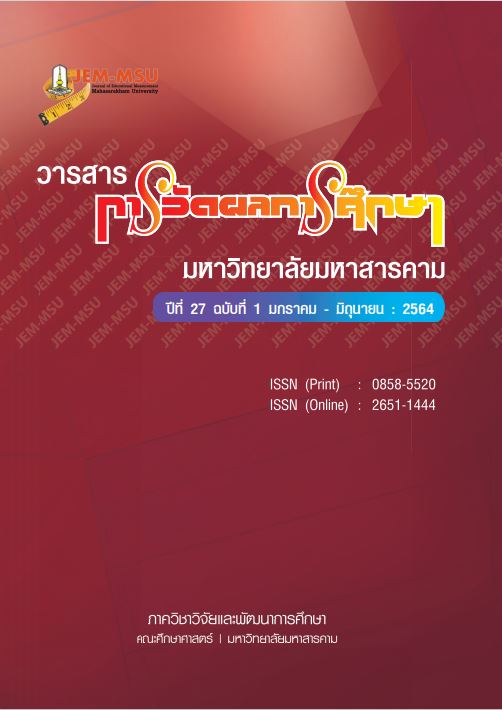Needs Assessment Research of Teachers’ Learning Transfer in Classroom Action Research
Main Article Content
Abstract
The research aimed to assess teachers’ needs and attitudes towards classroom action research, together with the knowledge and skills necessary for the conduct of classroom action research. The study was divided into 2 phases. Phase 1 was descriptive research. The data were collected from 564 teachers in schools under 4 organizations of affiliation. They were the Office of the Basic Education Commission, the Office of the Private Education Commission, the Local Government Organization, and the Department of Education of Bangkok Metropolis. An in-class survey questionnaire was adopted, along with the analysis of needs assessment by using the Modified Priority Needs Index (PNImodified). Phase 2 was qualitative research for an in-depth analysis, using interviews of a sample of 8 people. The qualitative data were analyzed by using content analysis.
The results indicated that: (1) The teachers’ needs assessment about learning transfer revealed that the teachers’ most urgent need was the knowledge of classroom action research, followed by the skills of classroom action research, and the attitudes towards classroom action research; (2) The results of the teachers’ interview analysis revealed that the knowledge of classroom action research that the teachers felt the need for development comprised the knowledge of innovation/treatment/intervention design, knowledge of data analysis, and knowledge of defining the research problem.
Article Details
The content and information contained in the published article in the Journal of Educational Measurement Mahasarakham University represent the opinions and responsibilities of the authors directly. The editorial board of the journal is not necessarily in agreement with or responsible for any of the content.
The articles, data, content, images, etc. that have been published in the Journal of Educational Measurement Mahasarakham University are copyrighted by the journal. If any individual or organization wishes to reproduce or perform any actions involving the entirety or any part of the content, they must obtain written permission from the Journal of Educational Measurement Mahasarakham University.
References
ณัฐมน สุชัยรัตน์. (2558). การพัฒนารูปแบบการเรียนการสอนตามแนวคิดการสืบสอบโดยใช้แบบจำลองเป็นฐานและแนวคิดการเรียนรู้โดยใช้บริบทเป็นฐานเพื่อส่งเสริมความสามารถในการให้เหตุผลเชิงวิทยาศาสตร์และการถ่ายโยงการเรียนรู้ของนักเรียนระดับชั้นมัธยมศึกษาตอนต้น. วิทยานิพนธ์ปริญญาดุษฎีบัณฑิต. สาขาวิชาหลักสูตรและการสอน คณะครุศาสตร์ จุฬาลงกรณ์มหาวิทยาลัย.
นนทกาญจน์ จันทร์เฮง. (2552). สภาพและปัญหาการดำเนินงานการวิจัยในชั้นเรียนของครูโรงเรียนบางบัวทอง สังกัดสำนักงานเขตพื้นที่การศึกษานนทบุรีเขต 2. (สารนิพนธ์ปริญญาศึกษาศาสตรมหาบัณฑิต สาขาวิชาการจัดการศึกษา), มหาวิทยาลัยธุรกิจบัณฑิตย์.
นิสดารก์ เวชยานนท์. (2559). การประยุกต์ใช้ความรู้ที่ได้รับจากการฝึกอบรม: กรณีศึกษาหลักสูตรการพัฒนาผู้บริหารระดับกลางของการประปานครหลวง. วารสารการจัดการภาครัฐและภาคเอกชน, 23(2), 175-211.
วิลาสิณี ทองสมนึก. (2554). ปัญหาการดำเนินการวิจัยในชั้นเรียนของครูผู้สอนโรงเรียนในเขตอำเภอหนองหญ้าปล้องสำนักงานเขตพื้นที่การศึกษาเพชรบุรีเขต 1. (วิทยานิพนธ์ปริญญาการศึกษามหาบัณฑิต สาขาการบริหารการศึกษา), มหาวิทยาลัยบูรพา.
ศักดิ์ชัย พนารัตน์. (2550). การพัฒนาการทำวิจัยในชั้นเรียนของครูโรงเรียนบ้านผือพิทยาสรรค์โดยใช้กระบวนการวิจัยเชิงปฏิบัติการ (รายงานการวิจัย). สำนักงานเลขาธิการสภาการศึกษา (สกศ).
สุจิกา เทพสถิต. (2553). ปัญหาการดำเนินการวิจัยในชั้นเรียนของครูผู้สอน สังกัดสำนักงานเขตพื้นที่การศึกษาบุรีรัมย์ เขต 3. (วิทยานิพนธ์ปริญญาครุศาสตรมหาบัณฑิต สาขาการบริหารการศึกษา), มหาวิทยาลัยราชภัฏบุรีรัมย์.
สุวิมล ว่องวาณิช, สวนีย์ วีระพันธุ์ และพนิดา มารุ่งเรือง. (2555). มโนทัศน์ด้านการวิจัยปฏิบัติการในชั้นเรียนของครู. การนำเสนอผลงานวิจัยแห่งชาติ 2554, สำนักงานคณะกรรมการการวิจัยแห่งชาติ.
Bai, L., Millwater, J., & Hudson, P. (2014). Chinese TEFL teachers’ perceptions about research and influences on their research endeavours. Teacher Development, 18(3), 349-368.
Blume, B. D., Ford, J. K., Baldwin, T. T., & Huang, J. L. (2010). Transfer of training: A meta-analytic review. Journal of Management, 36(4), 1065-1105.
Borg, S. (2010). Language teacher research engagement. Lang. Teach., 43(4), 391-429.
Borrell-Damian, L., Morais, R., & Smith, J. H. (2014). University-business collaborative research: goals, outcomes and new assessment tools. The EUIMA Collaborative Research Project Report. Brussels: Belgium.
Chen, H., Holton III, E. F., & Bates, R. A. (2006). Situational and demographic influences on transfer system characteristics in organization. Performance Improvement Quarterly, 19(3), 7-25.
Datnow, A. (2000). Power and Politics in the Adoption of School Reform Models. Educational Evaluation and Policy Analysis, 22(4), 357-374.
Farrell, M. P. (2003). Collaborative circles: Friendship dynamics and creative work. Chicago: University of Chicago Press.
Grossman, R., & Salas, E. (2011). The transfer of training: What really matters. International Journal of Training and Development, 15(2), 103-120.
Hair, J. F., Black, W. C., Babin, B. J. & Anderson, R. E. (2010). Multivariate data analysis. 10th ed. NJ: Pearson Education Inc.
Harland, J., & Kinder, K. (2006). Teachers’ Continuing Professional Development: framing a model of outcomes. Journal of In-Service Education, 23, 37–41.
Ismail, R., & Meerah, T. S. M. (2012). Evaluating the Research Competencies of Doctoral Students. Procedia - Social and Behavioral Sciences, 59, 244-247.
Kennedy, A. (2005). Models of Continuing Professional Development: a framework for analysis. Journal of In-Service Education, 31, 235-250.
Obaid, T. F., Alias, R. B., & Isa, A. A. B. M. (2016). Role of training transfer and post-training on job performance in middle eastern countries: Case of Palestine. Journal of Global Business and Social Entrepreneurship, 1(2), 77-87.
Saks, A. M., & Burke, L. A. (2012). An investigation into the relationship between training evaluation and the transfer of training. International Journal of Training and Development, 16(2), 118-127.
Taber, K. S. (2013). Action Research and the Academy: seeking to legitimise a ‘different’ form of research. An international journal of teachers’ professional development (Vol. 17, pp. 288-300): Routledge.
Velzen, J. H. V. (2013). Educational Researchers and Practicality. American Educational Research Journal, 50, 789-811.
Yuan, R., Sun, P., & Teng, L. (2016). Understanding Language Teachers’ Motivations Towards Research. TESOL Quarterly, 50(1), 220-234.


